- Writing a discussion essay, is it easy? What should one look out for? Find how to deliver such essay properly
- Best strategy to write an assignment. This is how we write it at Academic-Paper.
- How to write an essay that scores well
- Writing a dissertation, main aspects to remember. Core rules & points
- Comprehensive guide for writing a coursework
- What to count for while writing a research paper?
- Tips and advice on writing a great thesis
- Common strategies and mistakes while writing a personal statement
Common strategies and mistakes while writing a personal statement
Personal statements are the only way through which a student gets to talk to their admissions officer directly. The statement offers you the opportunity of selling yourself during the application process. It is a chance for you to show why you would be the right student for the particular program. It helps students to explain to their university why they need to offer them a chance in the respective course. The statement is an academic writing, which needs to target the direct subject. It is vital to present this statement in an efficient manner. Irrespective of the level of creativity, many students find it difficult to write about themselves. Our guide offers you the steps in writing your personal statement hence helping you to develop interesting personal statements.
A personal statement can be classified into two categories. These include:
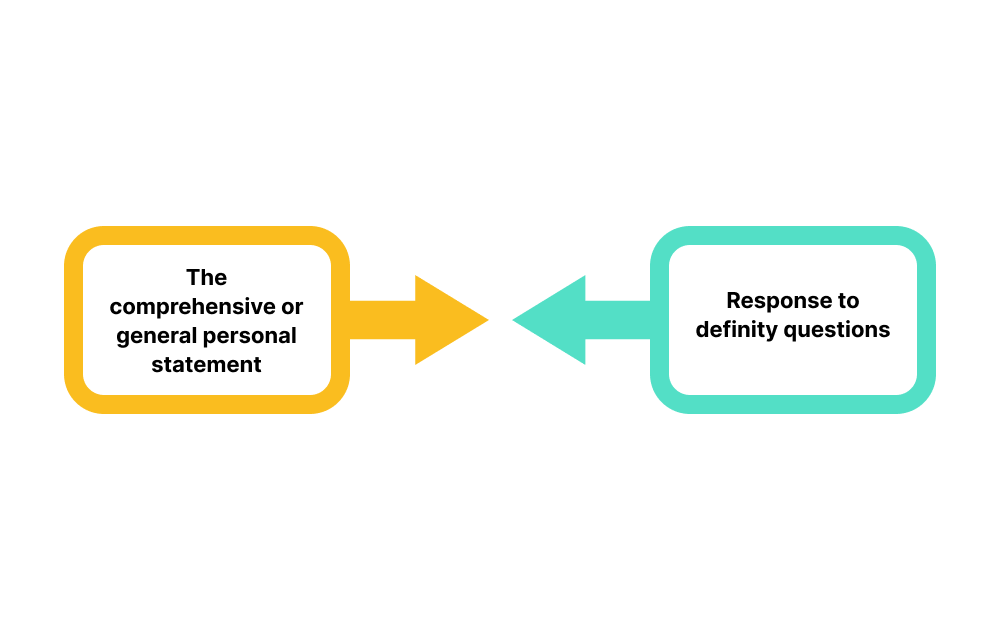
The comprehensive or general personal statement
A general personal statement provides you with more freedom in your writing. This statement is mostly prepared in law schools or standard medical application forms.
Response to definite questions
Graduate and business school application, sometimes ask definite issues. Your statement, in this case, must be accurate in responding to the asked questions. Some of these applications could favor many essays, which ask for responses to some questions. You are expected to read the questions carefully and make the efforts of understanding and responding to the questions with answers that are well organized. You need to answer in a persuasive manner to catch the interest of the reader
One challenge in writing a personal statement involves the applicant is not taking an analytic and thorough look towards themselves and their goals. The admission officers are looking for insightful, revealing, entertaining, and non-generic essays, which provide evidence of a self-examination and careful reflection process.
The admission officers are looking for an analytical and personal essay. This implies that, you are expected to share the information that you seldom share with others and assess your life in a critical way. This approach will undoubtedly yield a satisfactory statement.
Exercise
Before you write your personal statement, there are some questions that you need to ask yourself. These questions include:
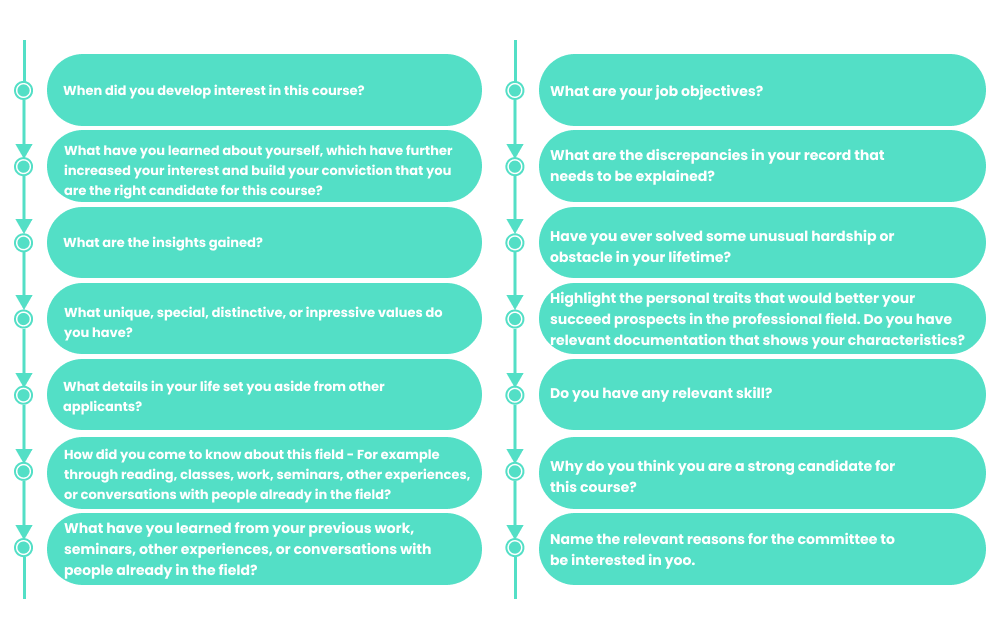
The questions in the image above are:
* When did your interest start growing in this course?
* What have you learned about yourself, which has further increased your interest and build your conviction that you are the right candidate for this course?
* What are the insights gained?
* What unique, particular, distinctive, or impressive values do you have?
* What details in your life set you aside from other applicants?
* How did you come to know about this field- For example through reading, classes, work, seminars
* What have you learned from your previous work, classes, reading, seminars, experiences, or conversation with other persons in the field?
* What are your job objectives?
* What are the discrepancies in your record that needs to be explained?
* Have you ever solved some unusual hardship or obstacle in your lifetime?
* Highlight the personal traits that would better your success prospects in the professional field. Do you have relevant documentation that shows your characteristics?
* Do you have any relevant skill?
* Why do you think you are a strong candidate for this course?
* Name the relevant reasons for the committee to be interested in you.
In writing a personal statement, a student should find out more information about his or her field of study. A personal statement reflects the intellect and personality of a student hence needs to be definite. If a student chooses to change his or her course, he will have to rewrite his personal statement.
A personal statement should cover the following areas:
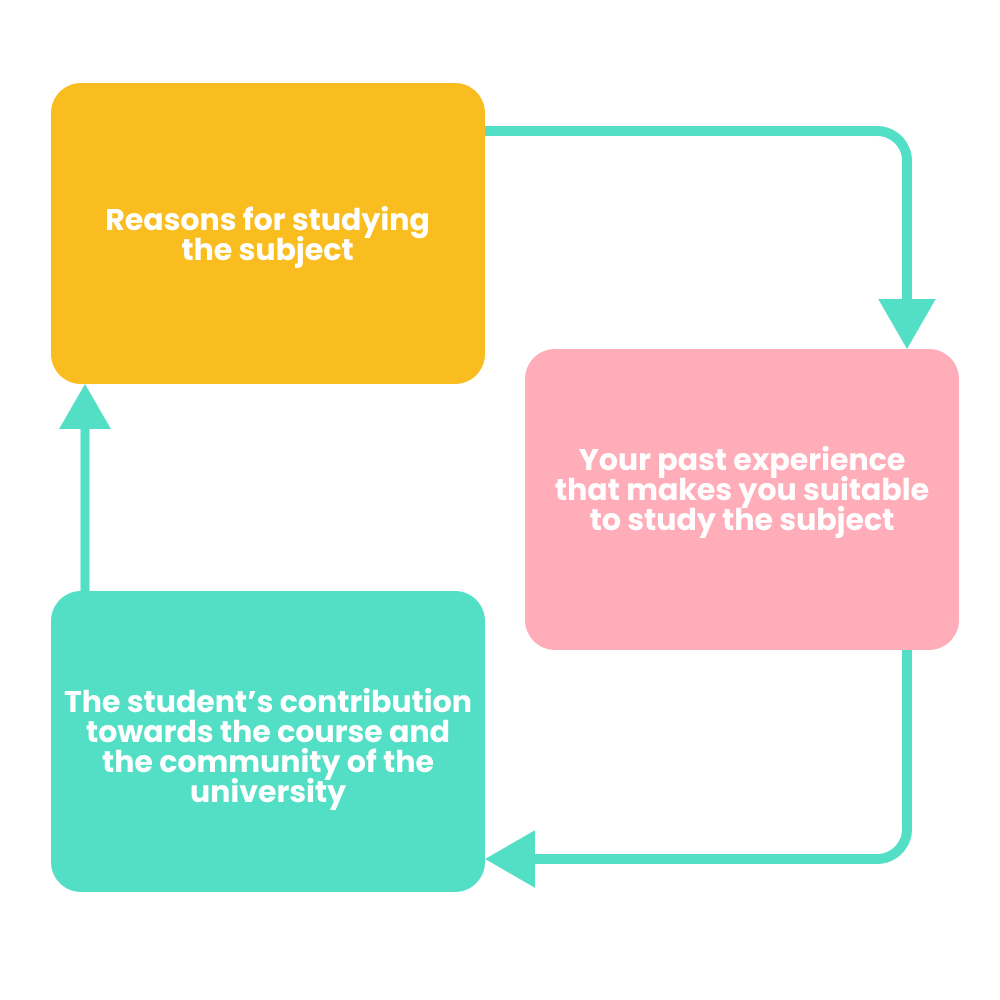
Why the subject
This can be given as some short sentence, which captures the main reasons why you have an interest in the selected program. The personal statement should be simple. It should explain the enthusiasm in the given program. In your writing, you can consider questions such as:
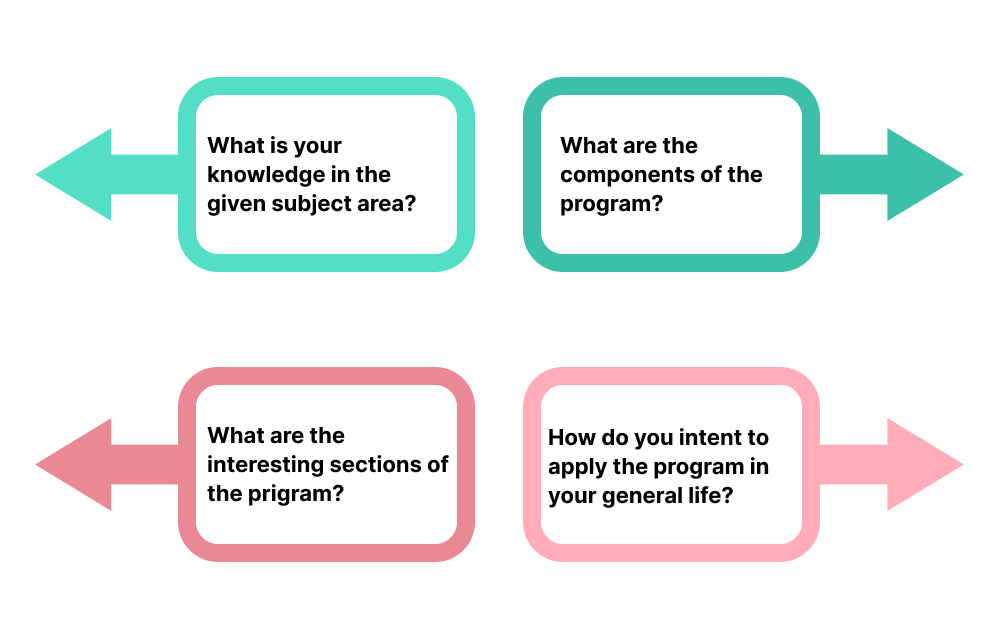
Why you?
After outlining the reasons why you are interested in a particular program, you are expected to show why you would be the right student for the program. You should try to demonstrate your ability and inclination in studying the program. The admissions tutor needs to know that you pose an appropriate background. This includes the academic ability, right desire, and proper interest in whatever the whole program covers. This section should include some evidences from:
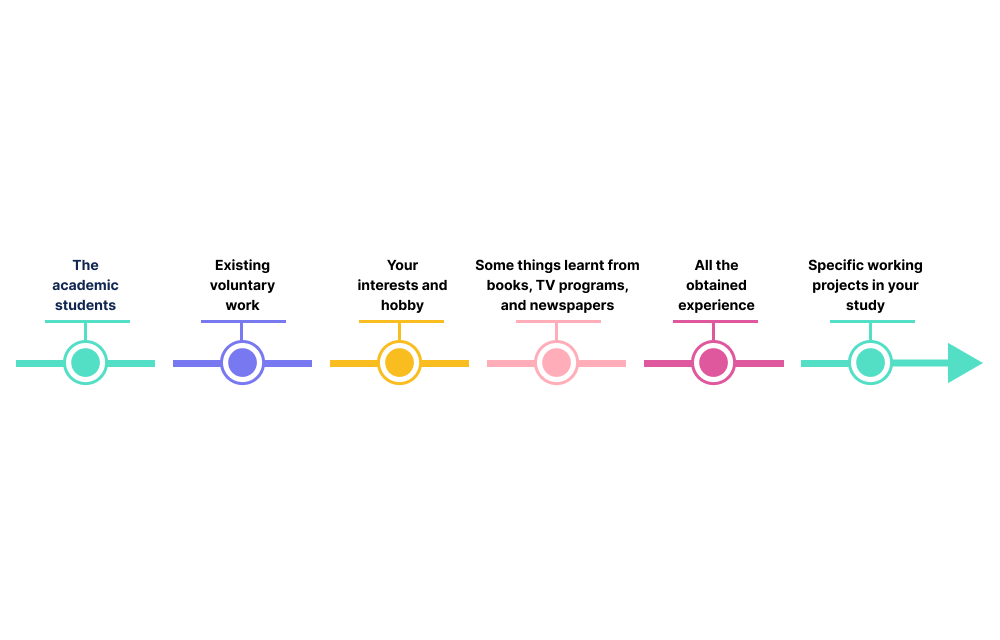
Are you unique or unusual?
The last section of your personal statement should include the uniqueness and interest of the student. This includes all the extra aspects you have experienced or done, that will provide some added advantage to the given university community. A reflection of the lessons and skills learned should be highlighted. This section could cover:
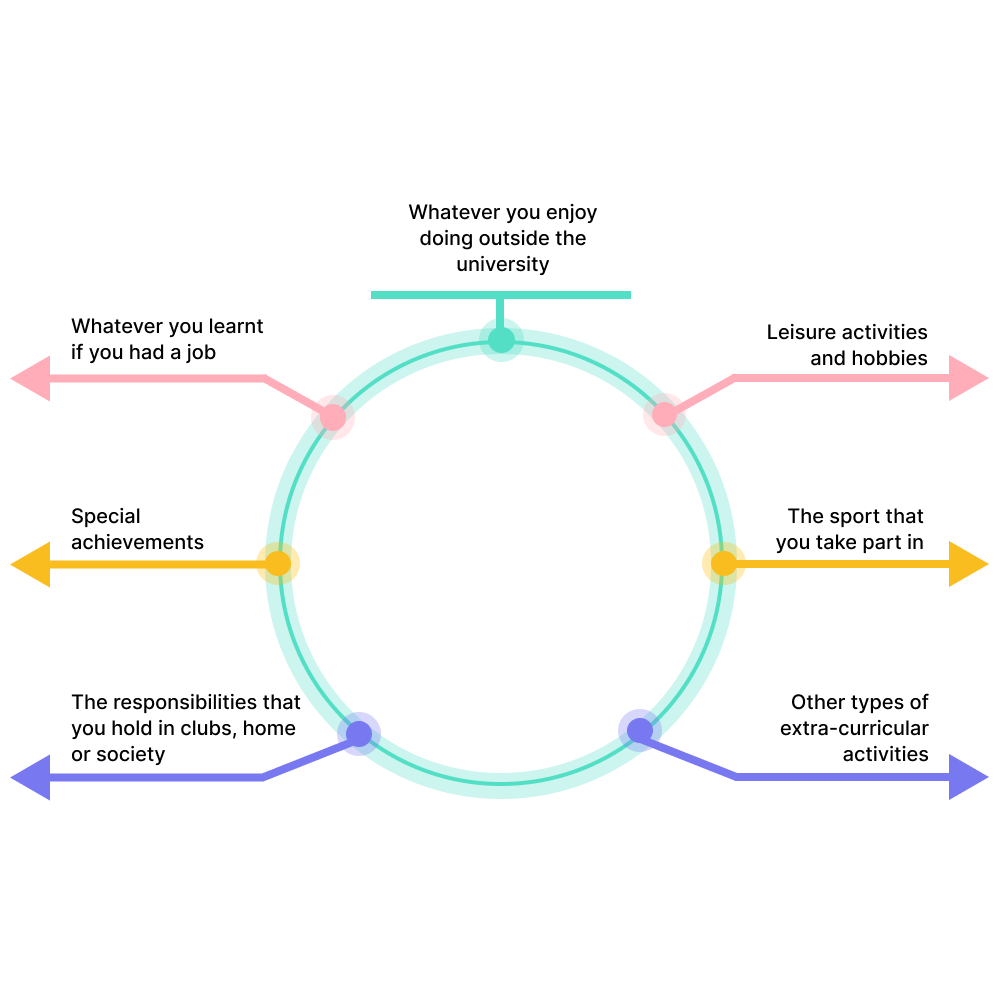
This section needs to include the important aspects of your life, and where necessary, the skills that would be helpful in your course. You should always remember to write in an informative, useful and entertaining way. Besides writing what you did, you should also try to explain the reasons for what you did and what you gained from it.
General advice
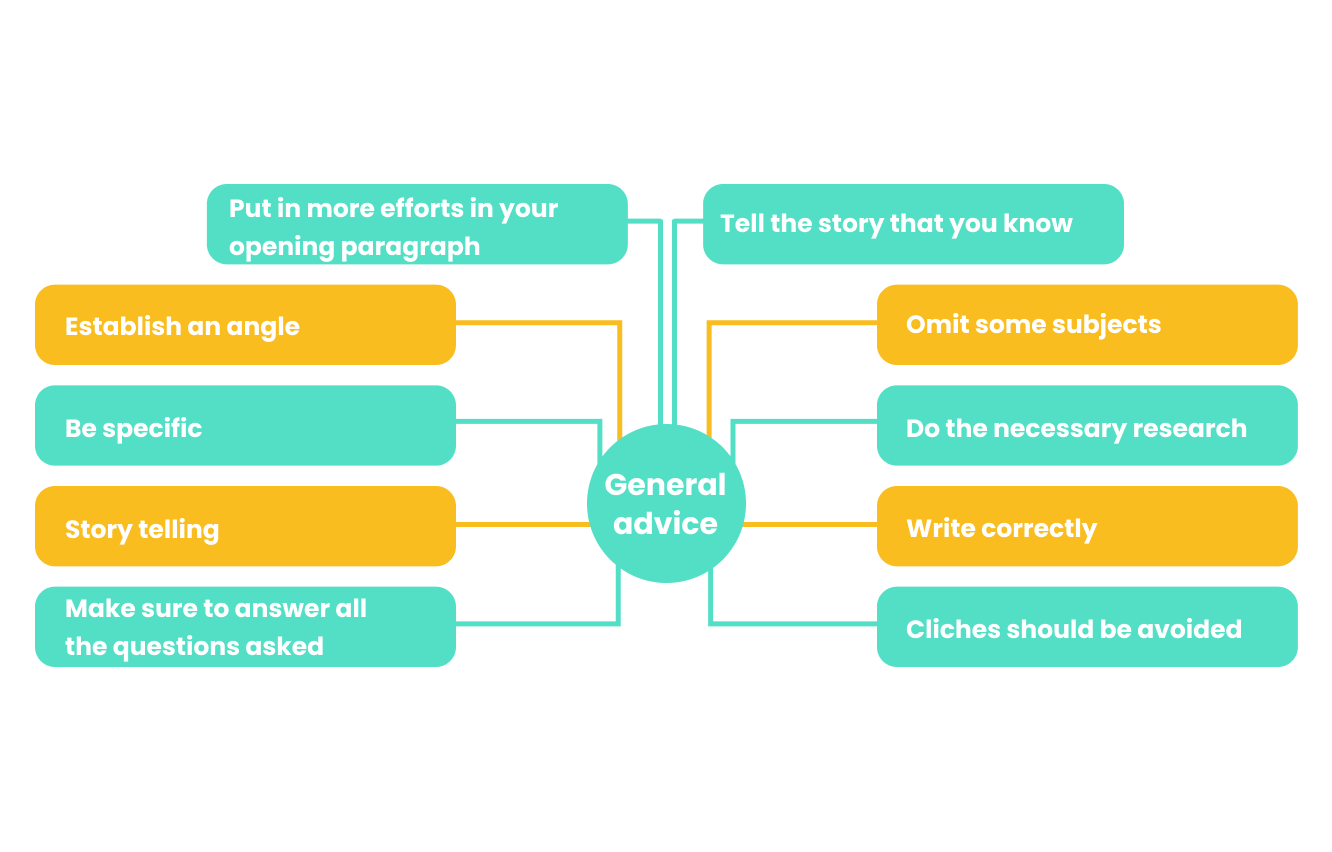
Consider to answer all the questions.
In a case where you have to send applications to several schools, you might come across similar questions in different application forms. You should avoid the temptation of using one application statement for all the applications. It is crucial to provide answers to the questions being asked. If slightly different answers are needed, a separate statement should be supplied. For each case, you should make sure that your reply is suiting for the question asked.
Story telling
You should organize your ideas to demonstrate your concrete experience. The worst mistake that you could do involves making the admissions committee to be bored with your statement. If you provide a fresh, different, and lively statement, you will be placing yourself in a better position. You should let your story distinguish your personality hence making you memorable.
Be specific
You should not state, for example, that you would be an excellent doctor without backing it up with particular reasons. The desire to be an engineer or lawyer needs to be logical. It should result from the concrete experience described in the statement. The application needs to come out to the logical conclusion of your story.
Establish an angle
You should create a hook or an angle to your story to introduce drama and make the statement interesting.
Put in more efforts in your opening paragraph.
The opening paragraph of your personal statement is the most crucial part of your essay. It is the framework of the entire statement. It determines whether the reader will have an interest in your article or lose it.
Tell the story that you know
The body of the statement should provide details regarding your experience, and interest in the particular field and some knowledge in the field. Many students graduate with minimum or no knowledge of the bolts and nuts of their profession or field that they intend to join. Try to go into details when linking your knowledge regarding the field. You should also utilize the professional language in passing the information. Provide a reference to classes, experiences, conversations, the read books, attended seminars, and any relevant source of your information. The fact that you will choose the contents of your statement means that your choices are an indication of your judgment.
Omit some subjects
There exist a few things that should be left outside the personal statement. For instance, references to accomplishments or experiences in high school or earlier may not be relevant to your statement. Avoid controversial subjects like political issues and religion.
Do the necessary research
In a case where a single school demands reasons why you selected it, you should perform the required research to establish whatever puts your choices apart from different universities or programs. For instance, it is vital to mention whether the school setting offers you an outstanding geographical relevance or changes in culture.
Write correctly
You must be meticulous in your writing. After typing your work, you should proofread it carefully. A number of admissions officers claim that good writing skills and proper use of language are important especially when they go through your work. You should express yourself concisely and clearly. You should also adhere to the highlighted word limit.
Clichés should be avoided
When a medical school applicant writes that he has good skills in science, and would wish to assist other people, he fails to express his thought in an original way. You should avoid repetition and use of tired statements.